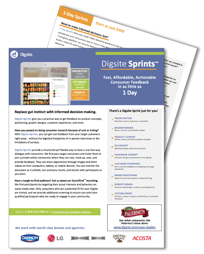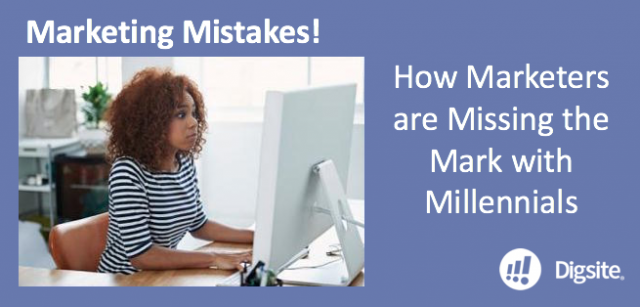
Who are the Millennials? Many marketers think they know Gen Y inside and out, but it turns out their assumptions about what drives this consumer group are missing the mark. This qualitative research report reveals how Millennials think - and more importantly - how they buy.
This is part 3 of a 3-part series of Marketing Health Products to Millennials. Using Digsite Sprints, we conducted a qualitative study on a group of 37 Marketing Professionals and 40 Millennials.
The goal: First, to see what assumptions Marketers were making about Millennials. Second, to test to see if those assumptions -- when executed in a marketing campaign -- were true.
Want a quick copy of the report?
Millennial Expert Jeff Fromm on Marketers’ Misconceptions
Marketers don’t have a clear picture of Gen Y, according to Jeff Fromm, President of FutureCast and Senior Partner at Barkley Advertising Agency, and an expert on Millennial marketing.
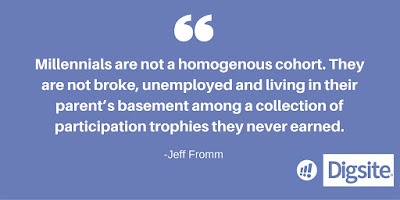
“Millennials are not a homogenous cohort,” said Fromm. “They are not broke, unemployed and living in their parent’s basement among a collection of participation trophies they never earned.”
Fromm should know. His company, FutureCast, is the authority on marketing to Millennials. FutureCast has teamed with countless research companies to analyze Gen Y inside and out, and what they’ve found is that Millennials are being mischaracterized. He noted:
-
6 million Millennials have household incomes over $100,000 a year
-
12 million Millennials have started families
“Over the next 25 years, 80 percent of Millennials will be like every generation before them as they step into their new roles of mom and dad,” Fromm notes in this research report. “There is still a tendency to report on Millennials as if they are ahead of the rest of us in technology adaptation and practitioners of all kinds of peculiar habits.”
The truth lies elsewhere, Fromm asserts. Our Digsite study backs him up.
_0.jpg)
Interview
A Unique Qualitative Research Tool for Revelatory Insights
First, a little background on the tool we used -- Digsite Sprints.
A Digsite Sprint is an on-demand market research study designed to get in-depth insights with a highly targeted audience over a period of 1-5 days. The Digsite Sprint is an online qualitative research tool, with an interface that resembles familiar social media. Participants are recruited through social media based on their attitudes, interests and behaviors.
We used a Digsite Sprint to study how Marketers believe Millennials think, and then compare that to the reality of how Millennials truly make their decisions. We’ll share the key takeaways throughout this post, but you can download a complete report on the study by clicking here.
Activity 1 - Brand Values: What do Millennials Look for in a Household Brand?
In Activity 1, we asked Marketers about what they thought Millennials would value in a household brand. Their replies reflect the conventional notions toward Gen Y. Note the emphasis on Eco-Friendly and Natural Ingredients:
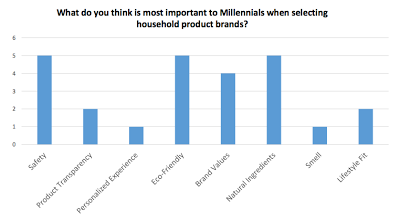
Millennials thought differently. Here are their responses. Price and smell are the biggest drivers when it comes to household products.
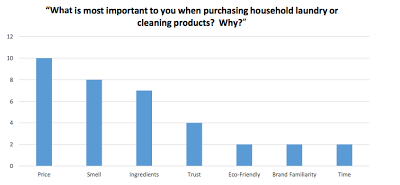
In another activity, we asked Marketers to sell a product to a Millennial by filling in the blanks in this sentence: “I think you should try ___ because it is ___. I like it better than ___ because ___.
Here is an example of what one Marketer wrote:

Then we asked Millennials to sell a product to a peer. Notice the contrast? It’s much more of a pragmatic response from the Millennial.

Key Takeaway #1: Price and Pragmatism Rule the Day
Millennials reacted more strongly to the price and the product transparency than Marketers thought. The environmental benefits were not the primary consideration.
View the report for full results of Activity 1.
Activity 2 - Brand Heritage: An Oldie is Still a Goodie
In the next activity, we used the Digsite Sprints’ whiteboard tool to evaluate how both groups reacted to some household brands.
Marketers were asked to place a “+” on any brand they thought Millennials would like, a “-” on any brand they would dislike, and a “?” on brands of which they were unsure. Millennials were asked to do the same and indicate their own preference.
Here are the brands we presented. Note some of the brands appeared to be targeting the preconceived notion of Millennials.
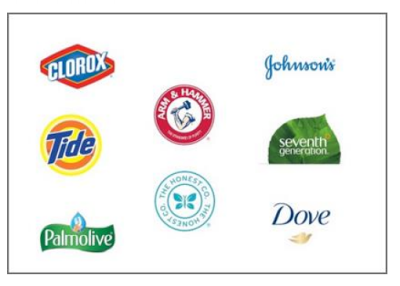
The responses were a study in contrast. Clorox, for example, was given a +4 positive number by Marketers, but actually scored a +17 with Millennials (full mark-up results available in the report).
Why? Check out a few of the Millennials’ verbatim comments to get some insight to their rationale:
“I love tide because that is what I grew up with. My moms used tide for her clothes."
“Not sure, I have heard great things (Honest Co.) but i myself havent tried it. I try to stay with brands i know and can trust to work everytime.”
Key Takeaway #2: Dethroning the King Isn’t as Easy as You Think
Despite the hyperbole regarding Millennials’ attitudes toward the environment, it seems that the tried and true brands of old are still what’s driving their decisions.
View the report to see full results from the brand mark-up activity.
Activity 3: Brand Preference - What Truly “Ads” Up?
We’ve evaluated high level decision-drivers and brand preferences for Gen Y, but what happens when the rubber hits the road and the products are marketed? What will Millennials decide when comparing actual products?
Using Digsite’s whiteboard technology, we ran a side-by-side comparison of two different ads of household products. Again, we asked the Marketers to predict the Millennials’ responses, and then we evaluated what the Millennials actually chose.
In this activity, we used ads from Tide and the Honest Company.
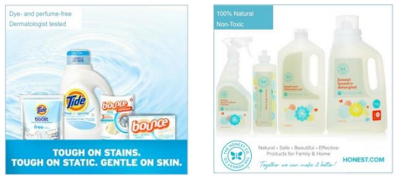
And the winner is...yes, you guessed it: Tide.
Once again, the Millennials reveal themselves to be a rather pragmatic bunch. Take a look at some of the verbatim comments:
“Tide stated their attributes simple and didn’t rely on using buzzwords to try to appeal to people.”
“The Tide & Bounce ad was a lot more cleaner, whiter, fresh & clean. The colors popped, the phrase dermatologist tested, makes it believable and credible. The Honest Co. ad felt dingy coloring, no colors popped, and it didn’t catch my eye. It seems as no effort is made on their ad.”
Key Takeaway #3: Buzzwords Don’t Create a Buzz
Buzzwords lose out in the face of a time-tested brand. “Natural” and “Safe” didn’t carry the day for the Honest Co. Instead, it was Tide’s practical approach, along with the fact that the brand has established years’ worth of brand equity.
View the report and see why Tide's ad won in the eyes of Millennials.
Millennials Talk Trust to Marketers
Part of the benefit of a Digsite Sprint is the ability to interact in real-time with your group participants, allowing a more agile approach to research. Throughout the study we paid close attention to common themes expressed by Millennials regarding the factors that play into their trust in a brand:
Brand Heritage Creates Trust: Millennials’ actions, particularly in Activity #2 and #3, were attracted to established brands that told a good story backed by historical proof of effectiveness.
Be Transparent - They are Skeptical: Having grown up in a world filled with marketing, Millennials are wary to advertisements. A quote from one participant sums it up:
.png)
Millennials are skeptical of your claims and, if necessary, will do their own research to check your product.
Social Support: This is about more than how people are talking about you on social media. It also refers to how you handle negative social activity, what your customer support is like, and how you generally conduct yourself in the eyes of the public.

View the report for a list of 6 ways Marketers can gain Millennials' trust.
Digsite allows participants to record videos of themselves and post them as part of the project. To round out the discussion, we asked the Millennials to record a video answering, “If you had a direct line to marketers to tell them how to be a trustworthy brand, what would you want them to know?”
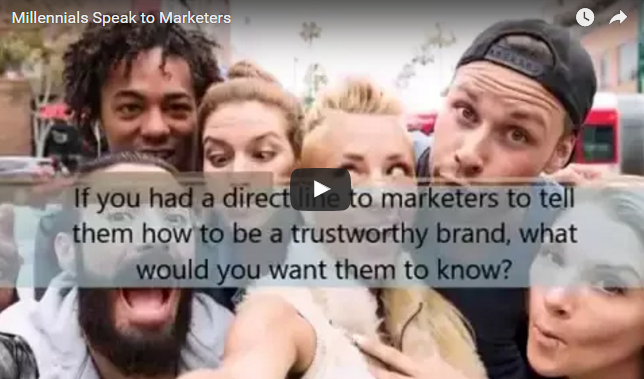
If you have additional interest, these topics are analyzed further in our recent webinar, “How Consumer Brands can Gain the Trust of Millennials.”
Millennials: The New Pragmatism
Make no mistake, Millennials are a unique generation, with unique characteristics. For example, Jeff Fromm notes this generation is more proficient at processing information than any generation before them.
However, they are still people, and people want their laundry to be clean and smell nice, especially as they begin families. “There is a new pragmatism for Millennials as they become parents,” Fromm said.
This Digsite Sprint was an eye-opening experience for Marketers in many ways. It’s a good lesson that the larger quantitative studies can only help provide a “big picture” of consumer groups.
But it’s qualitative data that reveals the nuance behind human decision-making, and as we’ve seen here - could prove the difference between success or failure for a product.
This is part 3 of 3 in our Millennial research series. If you're just joining us now, be sure to check out parts 1 and 2 at the below links:
- Part 1: Research Reveals What Hooks Millennials to Healthy Beverages
- Part 2: Brands Matter: Qualitative Research on How Millennials React To Household Products
To learn more about how your company can benefit from iterative research, check out our Digsite Sprints Fact Sheet!
